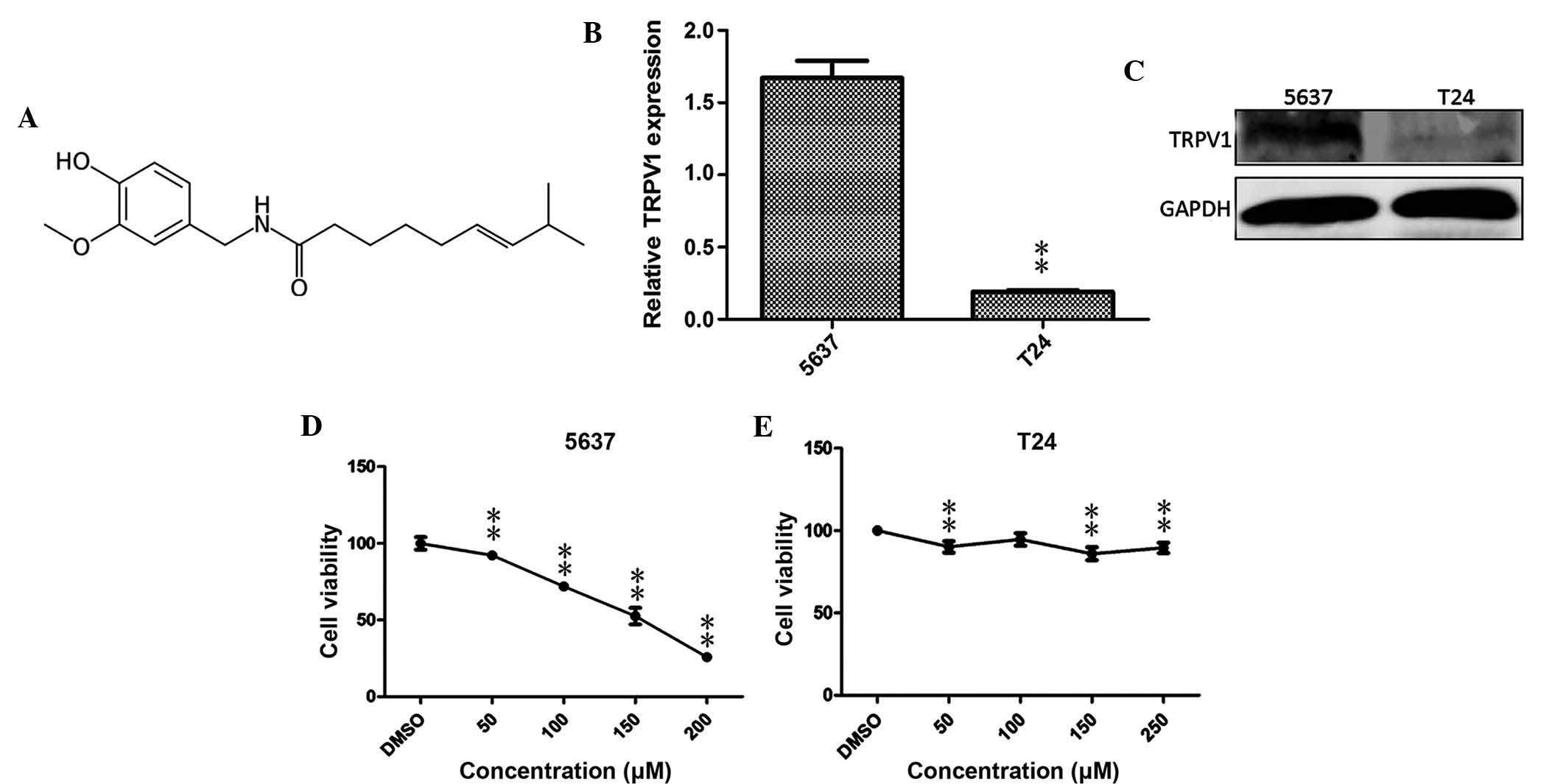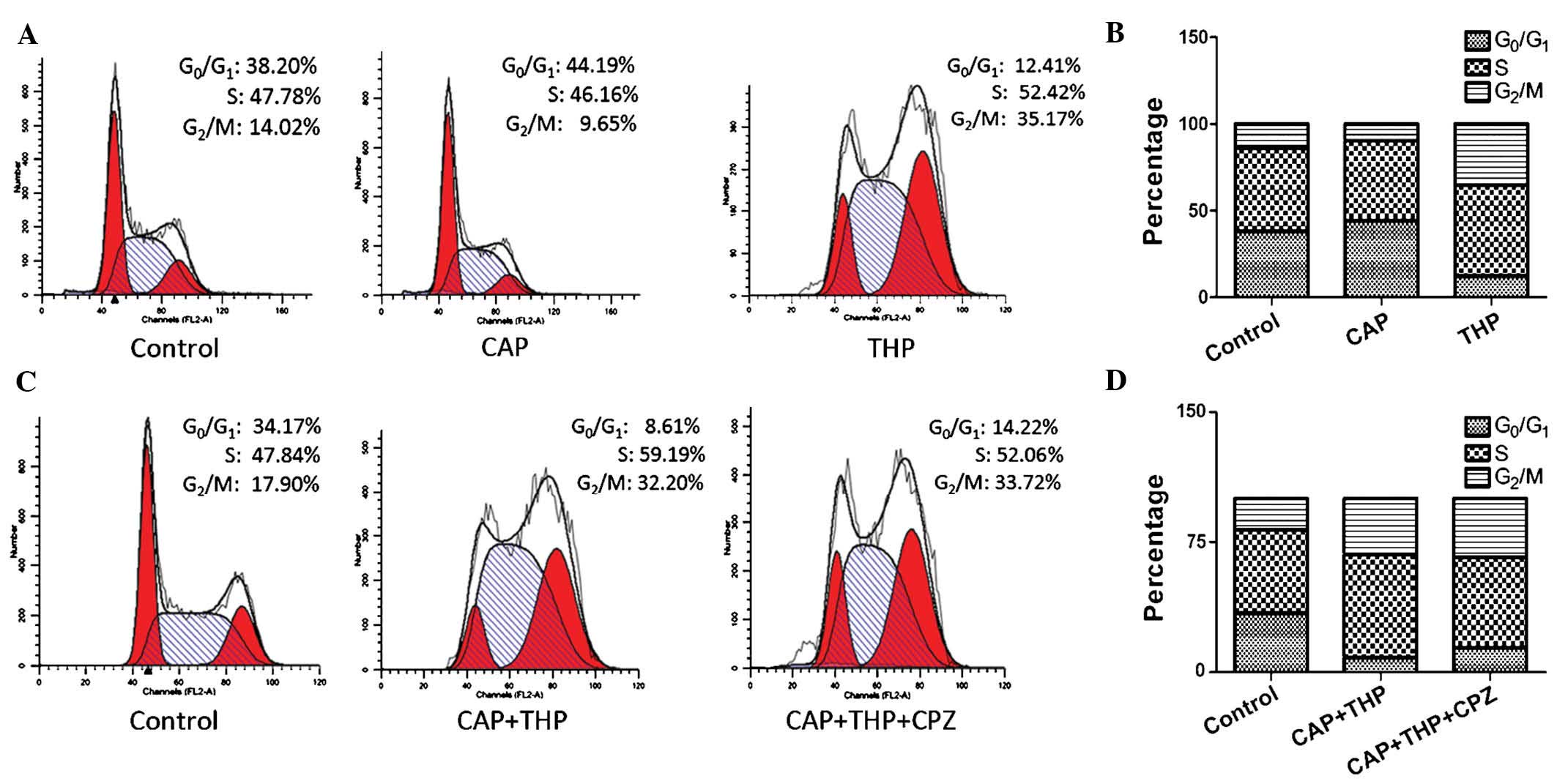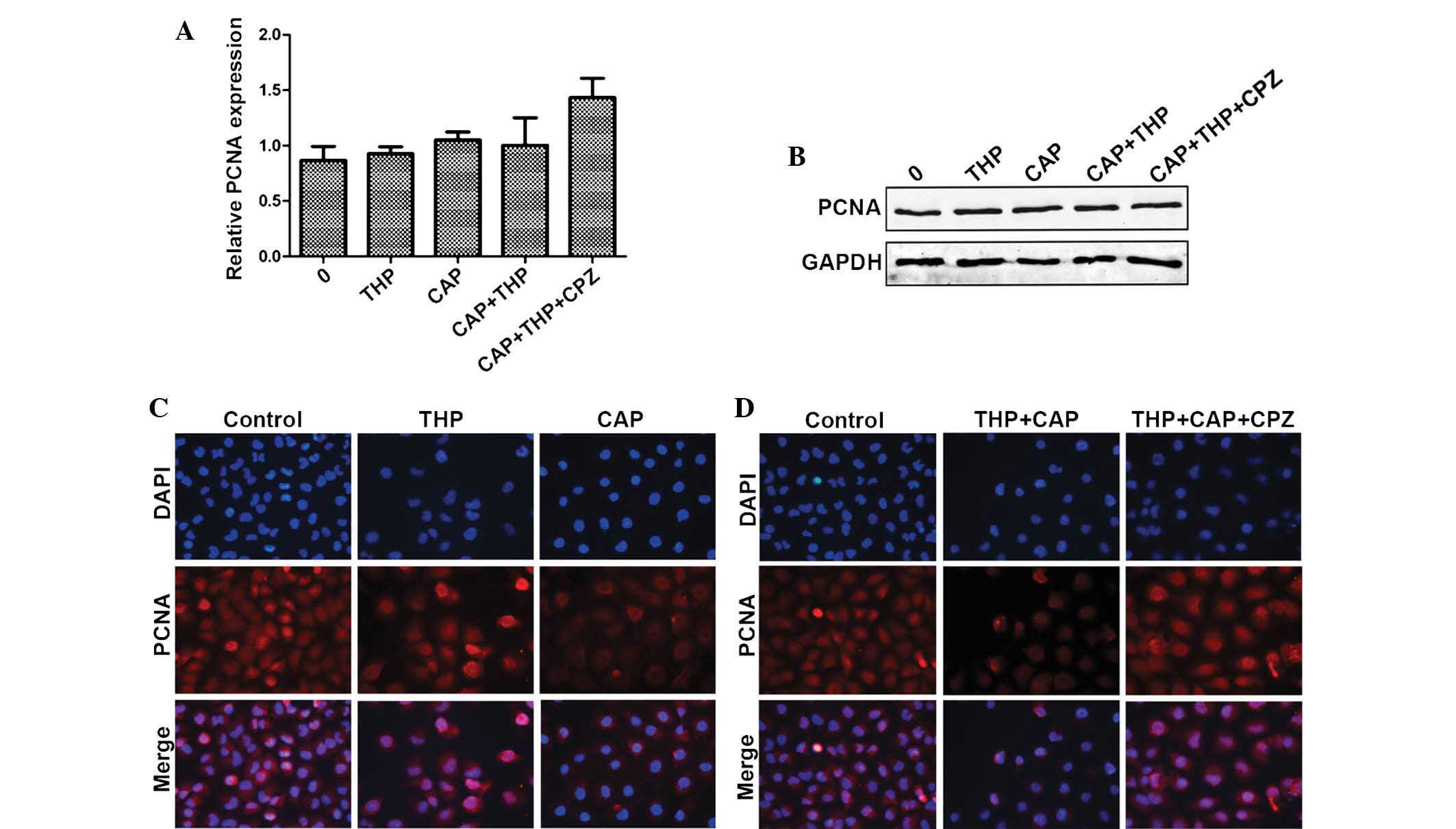|
1
|
Siegel R, Ma J, Zou Z and Jemal A: Cancer
statistics, 2014. CA A Cancer J Clin. 64:9–29. 2014. View Article : Google Scholar
|
|
2
|
Cookson MS, Chang SS, Lihou C, Li T,
Harper SQ, Lang Z and Tutrone RF: Use of intravesical valrubicin in
clinical practice for treatment of nonmuscle-invasive bladder
cancer, including carcinoma in situ of the bladder. Ther Adv Urol.
6:181–191. 2014. View Article : Google Scholar : PubMed/NCBI
|
|
3
|
Kamat AM and Lamm DL: Antitumor activity
of common antibiotics against superficial bladder cancer. Urology.
63:457–460. 2004. View Article : Google Scholar : PubMed/NCBI
|
|
4
|
Arakawa M, Nakamura K, Yamada Y, Kato K,
Katsuda R, Tobiume M, Zennami K, Watanabe M, Kato Y, Nishikawa G,
et al: Intravesical administration of pirarubicin against
superficial bladder cancer: Relationship between tumor tissue
concentration and exposure time in the bladder or therapeutic
effect. Exp Ther Med. 2:901–905. 2011.
|
|
5
|
Fukushima T, Ueda T and Nakamura T:
Pharmacokinetics and action mechanism of anthracyclines. Jpn J
Cancer Chemother. 19:445–450. 1992.In Japanese.
|
|
6
|
Miki T, Nonomura N, Kojima Y, Okuyama A,
Nakano E, Kiyohara H, Fujioka H, Koide T, Wakatsuki A, Kuroda H, et
al: A randomized study on intravesical pirarubicin (THP)
chemoprophylaxis of recurrence after transurethral resection of
superficial bladder cancer. Acta Urol Jpn. 43:907–912. 1997.In
Japanese.
|
|
7
|
Zhou J, Zhang X, Li M, Wu W, Sun X, Zhang
L and Gong T: Novel lipid hybrid albumin nanoparticle greatly
lowered toxicity of pirarubicin. Mol Pharm. 10:3832–3841. 2013.
View Article : Google Scholar : PubMed/NCBI
|
|
8
|
Cao E, Cordero-Morales JF, Liu B, Qin F
and Julius D: TRPV1 channels are intrinsically heat sensitive and
negatively regulated by phosphoinositide lipids. Neuron.
77:667–679. 2013. View Article : Google Scholar : PubMed/NCBI
|
|
9
|
Ho KW, Ward NJ and Calkins DJ: TRPV1: A
stress response protein in the central nervous system. Am J
Neurodegener Dis. 1:1–14. 2012.PubMed/NCBI
|
|
10
|
Avelino A and Cruz F: TRPV1 (vanilloid
receptor) in the urinary tract: Expression, function and clinical
applications. Naunyn Schmiedebergs Arch Pharmacol. 373:287–299.
2006. View Article : Google Scholar : PubMed/NCBI
|
|
11
|
Lazzeri M, Vannucchi MG, Spinelli M,
Bizzoco E, Beneforti P, Turini D and Faussone-Pellegrini MS:
Transient receptor potential vanilloid type 1 (TRPV1) expression
changes from normal urothelium to transitional cell carcinoma of
human bladder. Eur Urol. 48:691–698. 2005. View Article : Google Scholar : PubMed/NCBI
|
|
12
|
Vercelli C, Barbero R, Cuniberti B, Racca
S, Abbadessa G, Piccione F and Re G: Transient receptor potential
vanilloid 1 expression and functionality in mcf-7 cells: A
preliminary investigation. J Breast Cancer. 17:332–338. 2014.
View Article : Google Scholar : PubMed/NCBI
|
|
13
|
Wu TT, Peters AA, Tan PT, Roberts-Thomson
SJ and Monteith GR: Consequences of activating the
calcium-permeable ion channel TRPV1 in breast cancer cells with
regulated TRPV1 expression. Cell Calcium. 56:59–67. 2014.
View Article : Google Scholar : PubMed/NCBI
|
|
14
|
Stock K, Kumar J, Synowitz M, Petrosino S,
Imperatore R, Smith ES, Wend P, Purfürst B, Nuber UA, Gurok U, et
al: Neural precursor cells induce cell death of high-grade
astrocytomas through stimulation of TRPV1. Nat Med. 18:1232–1238.
2012. View
Article : Google Scholar : PubMed/NCBI
|
|
15
|
Mistretta F, Buffi NM, Lughezzani G, Lista
G, Larcher A, Fossati N, Abrate A, Dell'Oglio P, Montorsi F,
Guazzoni G and Lazzeri M: Bladder cancer and urothelial impairment:
The role of TRPV1 as potential drug target. Biomed Res Int.
2014:9871492014. View Article : Google Scholar : PubMed/NCBI
|
|
16
|
Amantini C, Ballarini P, Caprodossi S,
Nabissi M, Morelli MB, Lucciarini R, Cardarelli MA, Mammana G and
Santoni G: Triggering of transient receptor potential vanilloid
type 1 (TRPV1) by capsaicin induces Fas/CD95-mediated apoptosis of
urothelial cancer cells in an ATM-dependent manner. Carcinogenesis.
30:1320–1329. 2009. View Article : Google Scholar : PubMed/NCBI
|
|
17
|
Santoni G, Caprodossi S, Farfariello V,
Liberati S, Gismondi A and Amantini C: Antioncogenic effects of
transient receptor potential vanilloid 1 in the progression of
transitional urothelial cancer of human bladder. ISRN Urol.
2012:4582382012.PubMed/NCBI
|
|
18
|
Sanchez MG, Sanchez AM, Collado B,
Malagarie-Cazenave S, Olea N, Carmena MJ, Prieto JC and
Diaz-Laviada II: Expression of the transient receptor potential
vanilloid 1 (TRPV1) in LNCaP and PC-3 prostate cancer cells and in
human prostate tissue. Eur J Pharmacol. 515:20–27. 2005. View Article : Google Scholar : PubMed/NCBI
|
|
19
|
Costa MA, Fonseca BM, Keating E, Teixeira
NA and Correia-da-Silva G: Transient receptor potential vanilloid 1
is expressed in human cytotrophoblasts: Induction of cell apoptosis
and impairment of syncytialization. Int J Biochem Cell Biol.
57:177–185. 2014. View Article : Google Scholar : PubMed/NCBI
|
|
20
|
Lang H, Li Q, Yu H, Li P, Lu Z, Xiong S,
Yang T, Zhao Y, Huang X, Gao P, et al: Activation of TRPV1
attenuates high salt-induced cardiac hypertrophy through
improvement of mitochondrial function. Br J Pharmacol. Oct
23–2014.Epub ahead of print. PubMed/NCBI
|
|
21
|
Coelho A, Wolf-Johnston AS, Shinde S, Cruz
CD, Cruz F, Avelino A and Birder LA: Urinary bladder inflammation
induces Changes in urothelial nerve growth factor and TRPV1
channels. Br J Pharmacol. 172:1691–1699. 2015. View Article : Google Scholar
|
|
22
|
Kizek R, Adam V, Hrabeta J, Eckschlager T,
Smutny S, Burda JV, Frei E and Stiborova M: Anthracyclines and
ellipticines as DNA-damaging anticancer drugs: Recent advances.
Pharmacol Ther. 133:26–39. 2012. View Article : Google Scholar
|
|
23
|
Zheng SE, Xiong S, Lin F, Qiao GL, Feng T,
Shen Z, Min DL, Zhang CL and Yao Y: Pirarubicin inhibits
multidrug-resistant osteosarcoma cell proliferation through
induction of G2/M phase cell cycle arrest. Acta Pharmacol Sin.
33:832–838. 2012. View Article : Google Scholar : PubMed/NCBI
|
|
24
|
Takimoto CH and Calvo E: Principles of
oncologic pharmacotherapy. Cancer Management: A Multidisciplinary
Approach. 11:2008.
|
|
25
|
Garcia RL, Coltrera MD and Gown AM:
Analysis of proliferative grade using anti-PCNA/cyclin monoclonal
antibodies in fixed, embedded tissues. Comparison with flow
cytometric analysis. Am J Pathol. 134:733–739. 1989.PubMed/NCBI
|
|
26
|
Bravo R, Frank R, Blundell PA and
Macdonald-Bravo H: Cyclin/PCNA is the auxiliary protein of DNA
polymerase-delta. Nature. 326:515–517. 1987. View Article : Google Scholar : PubMed/NCBI
|
|
27
|
Kelman Z: PCNA: Structure, functions and
interactions. Oncogene. 14:629–640. 1997. View Article : Google Scholar : PubMed/NCBI
|
|
28
|
Kalogris C, Caprodossi S, Amantini C,
Lambertucci F, Nabissi M, Morelli MB, Farfariello V, Filosa A,
Emiliozzi MC, Mammana G and Santoni G: Expression of transient
receptor potential vanilloid-1 (TRPV1) in urothelial cancers of
human bladder: Relation to clinicopathological and molecular
parameters. Histopathology. 57:744–752. 2010. View Article : Google Scholar : PubMed/NCBI
|
|
29
|
Chen D, Yang Z, Wang Y, Zhu G and Wang X:
Capsaicin induces cycle arrest by inhibiting
cyclin-dependent-kinase in bladder carcinoma cells. Int J Urol.
19:662–668. 2012. View Article : Google Scholar : PubMed/NCBI
|
|
30
|
Gilardini Montani MS, D'Eliseo D, Cirone
M, Di Renzo L, Faggioni A, Santoni A and Velotti F:
Capsaicin-mediated apoptosis of human bladder cancer cells
activates dendritic cells via CD91. Nutrition. 31:578–581. 2015.
View Article : Google Scholar
|
|
31
|
D'Eliseo D, Manzi L and Velotti F:
Capsaicin as an inducer of damage-associated molecular patterns
(DAMPs) of immunogenic cell death (ICD) in human bladder cancer
cells. Cell Stress Chaperones. 18:801–808. 2013. View Article : Google Scholar : PubMed/NCBI
|
|
32
|
Hartwell LH and Kastan MB: Cell cycle
control and cancer. Science. 266:1821–1828. 1994. View Article : Google Scholar : PubMed/NCBI
|
|
33
|
Graña X and Reddy EP: Cell cycle control
in mammalian cells: Role of cyclins, cyclin dependent kinases
(CDKs), growth suppressor genes and cyclin-dependent kinase
inhibitors (CKIs). Oncogene. 11:211–219. 1995.PubMed/NCBI
|
|
34
|
Li Q, Wang XH, Yang ZH, Wang HP, Yang ZW,
Li SW and Zheng XM: Induction of cell cycle arrest in bladder
cancer RT4 cells by capsaicin. Chin Med J. 90:1230–1233. 2010.In
Chinese.
|
|
35
|
Mori A, Lehmann S, O'Kelly J, Kumagai T,
Desmond JC, Pervan M, McBride WH, Kizaki M and Koeffler HP:
Capsaicin, a component of red peppers, inhibits the growth of
androgen-independent, p53 mutant prostate cancer cells. Cancer Res.
66:3222–3229. 2006. View Article : Google Scholar : PubMed/NCBI
|
|
36
|
Bunch RT and Eastman A:
7-Hydroxystaurosporine (UCN-01) causes redistribution of
proliferating cell nuclear antigen and abrogates cisplatin-induced
S-phase arrest in Chinese hamster ovary cells. Cell Growth Differ.
8:779–788. 1997.PubMed/NCBI
|
|
37
|
Koundrioukoff S, Jónsson ZO, Hasan S, de
Jong RN, van der Vliet PC, Hottiger MO and Hübscher U: A direct
interaction between proliferating cell nuclear antigen (PCNA) and
Cdk2 targets PCNA-interacting proteins for phosphorylation. J Biol
Chem. 275:22882–22887. 2000. View Article : Google Scholar : PubMed/NCBI
|
|
38
|
Moldovan GL, Pfander B and Jentsch S: PCNA
controls establishment of sister chromatid cohesion during S phase.
Mol Cell. 23:723–732. 2006. View Article : Google Scholar : PubMed/NCBI
|
|
39
|
Yoshikawa H, Ikeuchi T and Kai Y:
Immunohistochemical study of the proliferating ability and
malignant potential of transitional cell carcinoma in the human
urinary bladder. Int J Urol. 3(Suppl 1): S32–S34. 1996. View Article : Google Scholar : PubMed/NCBI
|
|
40
|
Inagaki T, Ebisuno S, Uekado Y, Hirano A,
Hiroi A, Shinka T and Ohkawa T: PCNA and p53 in urinary bladder
cancer: Correlation with histological findings and prognosis. Int J
Urol. 4:172–177. 1997. View Article : Google Scholar : PubMed/NCBI
|
|
41
|
Tong Q, Zeng F, Lin C, Zhao J and Lu G:
Growth inhibiting effects of antisense eukaryotic expression vector
of proliferating cell nuclear antigen gene on human bladder cancer
cells. Chin Med J (Engl). 116:1203–1206. 2003.
|
|
42
|
Zhu Z, Xing S, Lin C, Zhang X, Fu M, Liang
X, Zeng F, Lu G and Wu M: Bladder cancer therapy using combined
proliferating cell nuclear antigen antisense oligonucleotides and
recombinant adenovirus p53. Chin Med J (Engl). 116:1860–1863.
2003.
|
|
43
|
Bodó E, Bíró T, Telek A, Czifra G, Griger
Z, Tóth BI, Mescalchin A, Ito T, Bettermann A, Kovács L and Paus R:
A hot new twist to hair biology: Involvement of vanilloid
receptor-1 (VR1/TRPV1) signaling in human hair growth control. Am J
Pathol. 166:985–998. 2005. View Article : Google Scholar : PubMed/NCBI
|
|
44
|
de Jong PR, Takahashi N, Harris AR, Lee J,
Bertin S, Jeffries J, Jung M, Duong J, Triano AI, Lee J, et al: Ion
channel TRPV1-dependent activation of PTP1B suppresses
EGFR-associated intestinal tumorigenesis. J Clin Invest.
124:3793–3806. 2014. View Article : Google Scholar : PubMed/NCBI
|


















